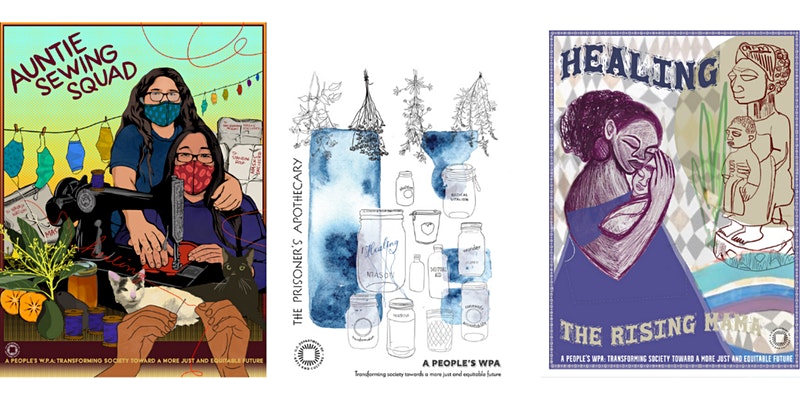
Images from the event. This discussion featured jackie sumell (The Prisoner’s Apothecary), Auntie Sewing Squad, Ana Rodney, and Taja Lindley.
A discussion presented by The U.S. Department of Arts and Culture (USDAC) with 18th Street Arts Center, in L.A.
Part of WE RISE 2022
Friday, May 20, 2022 6 pm-7:30 pm ET
ONLINE
We Rise 2022 on Facebook
U.S. Department of Arts and Culture on Facebook
Review by Afrikah Smith
“As we have seen time and time again, when the governments fail us, it’s the people who come together and help communities survive…” —Raquel de Anda, panel facilitator
ZOOM — Presented by the U.S. Department of Arts and Culture, the discussion centered on the intersection of arts and mutual aid and what it means to create and be in community with one another. Emphasizing the ways that are anti-oppressive and that uplift and respect one another in community, the panel featured jackie sumell of The Solitary Gardens & Prisoner’s Apothecary, Kristina Wong and the Auntie Sewing Squad, Ana Rodney of MomCares, and interdisciplinary artist Taja Lindley. All whose work exemplified art, healing, and mutual aid efforts through the lenses of abolition, radical care, reproductive justice, transformative justice, and racial justice.
With one newscycle crisis after another, Artists and Healers as Essential to Recovery from Crisis was a timely discussion of how artists and healers have taken action towards mutual aid efforts on local, national, and global scales. In a role reversal between politicians and artists, many politicians have brought spectacle and drama while artists have coordinated the emergency care, activism, movement, and mutual aid efforts for their communities.
Entering the Zoom space with 121 attendees, we were welcomed by the USDAC staff with somatic breath, land acknowledgement, and framing of mutual aid. Brienne Colston, USDAC Co-Director of Community Healing and Transformation, introduced to attendees this statement:
“Mutual aid is collective coordination to meet each other’s needs, usually from an awareness that the systems we have in place are not going to meet them. These systems, in fact, have often created the crisis, or are making things worse.”
Inviting us to a group exercise, Colston asked attendees to respond to the following questions: What do we want to bring to this space as an offer? What do we need?
Flooding the document, responses varied from offerings of curiosity, presence, and deep listening to needing connection to tools & resources to sustain this movement, respecting the process, and healing. With a room of caring, open-minded artists, allies, and learners eager to dive right in, Raquel de Anda, USDAC Minister of Bridge Building, began facilitating the panel. She began with introductions and presentations of each panelist and their work.
Acknowledging that the practice is messy and there is still work to be done, the panel uplifted the need to envision what it means to continue the work post-pandemic. It raised awareness for care needing to be reciprocated to those who are responding to the needs of the community. While presenting the impact of the work of the Auntie Sewing Squad (lovingly known as ASS), Wong spotlighted the challenge of how their labor was viewed as generous and free; while the risks of getting materials and resources and hours dedicated to sewing went unacknowledged. For Rodney, she spoke to the rising issue of hospitals attempting to replicate the work of doulas to avoid compensation for their work and advocacy, only to cause more harm by medical professionals who are not trained and experienced doulas.
Flagging the reality of burnout, the panelists pointed out that the care that they ask for is not transactional, and is instead, a reminder that they are human. They must be seen as that. Reckoning with capitalism and the ways in which it has affected relationships with one another, and how we view abolition and mutual aid, care must be reciprocated in order for all of us to sustain solidarity and labor.
As the event came to a close, the USDAC staff invited us to continue the work both personally and professionally, and continue the conversations and visioning of how artists as laborers can help build the world that we deserve to live in.
To learn more about how to be involved with the U.S. Department of Arts and Culture, visit https://usdac.us/takeaction.
